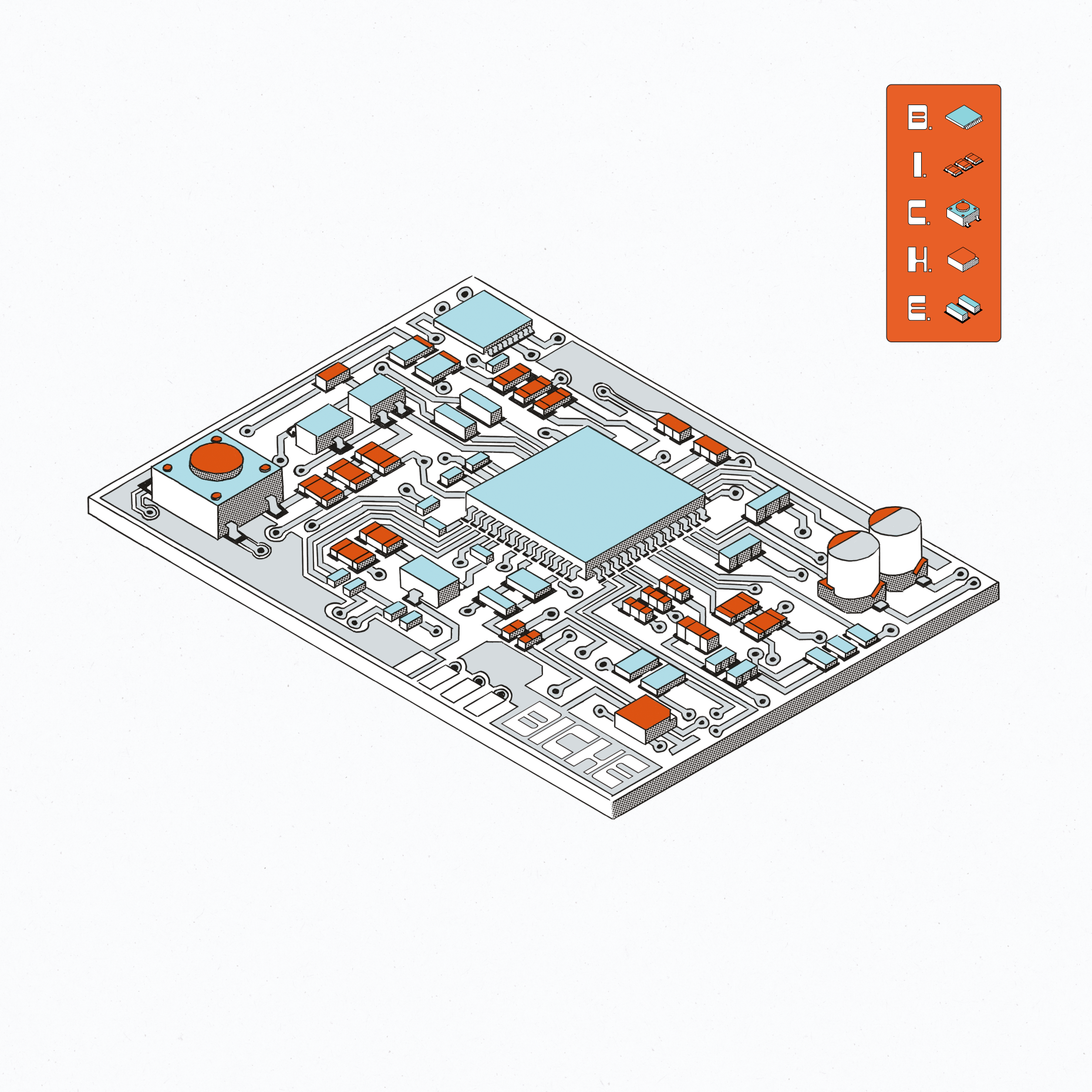
B.I.C.H.E.
—
Release on 07 February 2025
—
Ça va Sound



Alexis Fugain knows that, whatever he does, everything is part of a spiral. An eternal restart, the centre point of which becomes increasingly blurred as the years go by. Biche, what was it in the beginning? Five people who didn’t know each other until they got together behind their respective instruments in the rehearsal room, taming each other through sound and a shared desire to produce atmospheres that would make them travel and dream as much as their idols. It was aesthetic choices, the candour of late adolescence, a first album shrouded in insouciance and the almost magical fusion of their energies on stage. It was beautiful, sincere, it made sense at the time, but a group remains the sum of distinct personalities that move forward, mature, change their minds and skins, and remain sensitive to the movements of the world. You could say that Biche follows the trajectory of its first spiral, yes, but the line changes colour, becomes erased and enlarged in places. Somewhere in the equation, the data has been altered a little, just enough to let in a breath. And with this second album, the band find themselves as if emerging from a dream, a little numbed by the variations of their fantasies but ready to tell the story of life, real life, in all its unpredictability.
Built like an infinite loop, ‘Une Brève Interrogation sur les Cycles Humains’ brings together Alexis Fugain, Brice Lenoble, Alexis Croisé, Thomas Subiranin and Florian Adrien, the latest member of the band, who arrived just as the first track on the album was being recorded. Biche has always taken its time, and the eleven tracks on the new album are a testament to that, complex and full of life, like souls that have lived. The whole thing is faster, more nervous, we leave the yellowed postcard territories to wander at cheetah speed through streets we had ignored. Things are said, poetic as ever, suspended in space, against instrumentations rich in electronic components. Circular movements imply repetitive music, but there was no question of locking the tracks down; on the contrary, nothing is quantified, everything is restless and hiccups relentlessly. This time round, the band have drawn on the retro-futuristic ambiences of Stereolab’s Dots and Loops period and Beck’s Mellow Gold. For Biche, the production and craft aspects of their music are not just details; on the contrary, they are at the very heart of their creative process, which emphasises an impressively meticulous idea of the home-made. Naturally, as much out of a taste for what stands out under the microscope as for the big picture, each track has been built up step by step, sometimes sounding like a Russian doll that could be undressed forever. The time spent on the arrangements, which was spread over several years, was an opportunity to invite fellow musicians to play alongside them and to reveal certain personalities and aesthetics within the eleven capsules of the record.
The first track sets us straight on the trail of all the questions that flash in turn throughout the album, an entry into Biche’s slightly obsessive brain. The circuit lights up slowly, and already everything is there. The contrast of the arrangements, the gentle resignation of a speech that is repeated over and over, and the extreme attention to detail. Then comes ‘Déjà-vu’, a pop mirage of melancholy inseparable from Alexis Fugain’s songwriting, recorded instinctively, in a flash, in the small room of the Claudio studio. Everything is done on the spot, in collaboration with their long-time sound engineer Vincent Hivert, with precise preparation work to ensure that the listener is as close as possible to the live experience. It’s difficult to comment on certain events in society, especially when they are still hot, changing and close enough for us to have very little perspective. In ‘Le Code’, Biche talks about his own disillusionment with algorithms and the misunderstandings they generate. Without playing the old fart or complaining into the wind, the text humorously navigates the rules that now govern us, from the point of view of someone who would have the impression of being the master. A strange staircase to nowhere, ‘Le Mont Ventoux’ takes as its starting point the famous stage of the Tour de France (a nod to Kraftwerk) to explore the trajectory of teamwork, of a well-oiled machine in which every little component gets the signal across. Rather discreet about his private life, Alexis Fugain makes a small exception for the only love song on the album, ‘Labrador’, a declaration to his beloved dog. Over elegant instrumentation and jazz arrangements, he lays down snatches of thought on the cyclical love and ever-renewed fidelity of the animal, whose only ineluctable end is its disappearance. Americanism’, co-written by Margaux Bouchaudon of En attendant Ana, picks up the tempo a little and offers a two-voice narrative, a digression into the systems that plague us, make us dream and highlight our paradoxes. These are behemoths that we feed a little, by force of circumstance, that we enjoy hating or that we observe from a new angle. Next up is Nick Wheeldon on vocals on ‘Ça va…’, whose acerbic lyrics depict a sedated society set against a dizzying Pierre Henry-style jam. Wheeldon’s distinctive phlegmatic English folk meets the synthetic vibrations of Biche before the 200 BPM surge of ‘La Spirale’. It’s all about the golden ratio, that mysterious ‘divine proportion’ that has been used in architecture and art since Antiquity and whose shape, when written out in full, resembles a seashell. Deliberate confusion, text with holes, it’s up to the listener to take the story wherever they want. And then it’s a moment of peace, the eardrum grafts itself to the frequency ‘8.432 KHz’, the only one that manages to relieve the tinnitus lodged for life at the back of Alexis’s ear, before the fascinating ‘L’Engrenage’, where he puts forward some not-so-far-fetched hypotheses about a possible dismantling of the capitalist machine. Then Biche closes the loop with ‘Les Cycles Humains’, a simple piano and clarinet line played by Romain Vasset de Belvoir, repeating the refrain from the very first track as if history were already repeating itself, his finger a few millimetres from the play button. After all, what could be more human than listening to an album over and over again?